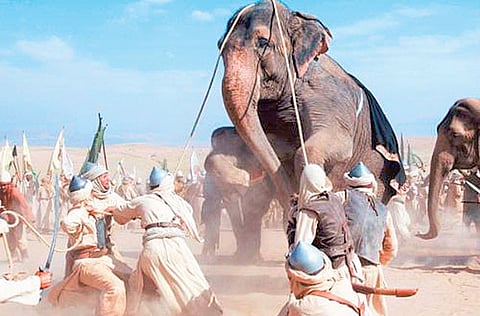TV drama Omar is steeped in Islamic history
Buzz over Omar, including continuing controversy, helped to increase the number of viewers

Dubai: A few days before Ramadan, a prominent Egyptian critic Tareq Shinawi wrote an article saying “half a billion people are waiting for Al Farooq”. The buzz over the drama, including the continuing controversy, helped to increase the number of viewers to “Omar” which centres on the life of Omar Bin Al Khattab, the second of four caliphs and a revered figure in Islamic history. Omar was given the title of Al Farooq for his fairness and justice, as the title means ‘the one who distinguishes between the right and wrong’.
“People everywhere are waiting to watch “Omar”,” wrote Shinawi. “Such a drama, if presented with a high level of production and historical accuracy, will convey so much [information] about Islam which, unfortunately, has become a target for attack in many media,” he said.
“Such a drama production could become a weapon in our hands and a positive power in presenting a correct image of Islam,” Shinawi added, before asking “what is the advantage of forbidding?”
He was referring to calls to boycott the drama on the basis it depicts Omar, the other three caliphs and the close companions of Prophet Mohammed (PBUH).
Omar, which is a joint production of the Saudi-owned Middle East Broadcasting Corporation (MBC) and Qatar television, is the biggest production ever in the history of Arabic television. The cost of the series has not been revealed but is estimated at several tens of millions of dollars.
Commenting on clerics’ calls not to watchthe series, an authoritative source at MBC described the issue as “very sensitive” before adding that “we don’t give commentaries on fatwas [religious edicts] and we don’t comment on security matters”, as a basic rule because “these are not within our area of authority”.
Speaking to Gulf News, the well-informed source stressed that since the early beginnings of the process of producing “Omar”, “several meetings with different religious authorities were held. “Some were announced in the media, and some were not”.
“Another committee comprising prominent clerics was consulted to check the accuracy of the script and to verify the historical facts…the committee of respected clerics was informed of the details of the production.”
Paying attention to the nitty-gritty of the drama was necessary because the two groups (MBC and Qatar TV) “are keen to have a production that is credible, honest and accurate with historical facts and this is a big and ambition goal behind rewriting history through television drama,” added the source.
“We respect every opinion and appreciate it, but we also call on people to watch it and then have their say,” said the source, referring to calls to refrain from watching the series.
“Omar” has all the elements of success, the MBC source said.
Apart from the big budget, verification committee, good script-writer and director and high production levels, Omar’s character and its symbol in Islamic history plays an important role in encouraging people to watch, the source said.
“There are lots of values that people speak of, such as good governance, justice, equity, wisdom, tolerance and patience. It worthwhile that we and our children learn that these values were part of that era in Islamic history”.
“It is duty to show this drama to all interested people, Muslims and non-Muslims, regardless of language and their location,” the source said.
“Omar” is the first Arabic drama series to be dubbed in other languages and shown outside the Arab region, MBC officials noted earlier. Agreements have been reached to show it in Turkey and Indonesia, and there were discussions to dub it in other languages, including English and French.



